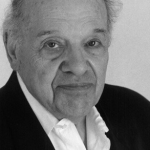The thing about the dove was how he cried in
my pocket and stuck his nose out just enough to
breathe some air and get some snow in his eye and
he would have snuggled in but I was afraid
and brought him into the house so he could shit on
the New York Times, still I had to kiss him
after a minute, I put my lips to his beak
and he knew what he was doing, he stretched his neck
and touched me with his open mouth, lifting
his wings a little and readjusting his legs,
loving his own prettiness, and I just
sang from one of my stupid songs from one of my
vile decades, the way I do, I have to
admit it was something from trains. I knew he’d like that,
resting in the coal car, slightly dusted with
mountain snow, somewhere near Altoona,
the horseshoe curve he knew so well, his own
moan matching the train’s, a radio
playing the Inkspots, the engineer roaring.

Comment form: